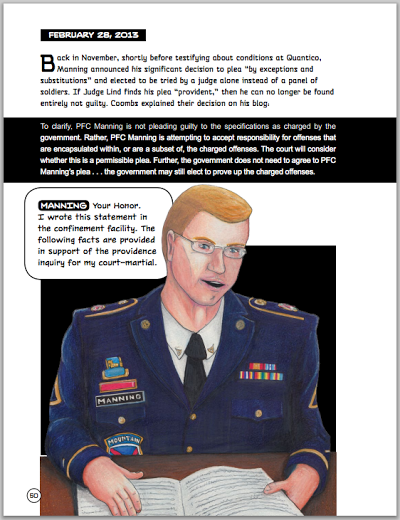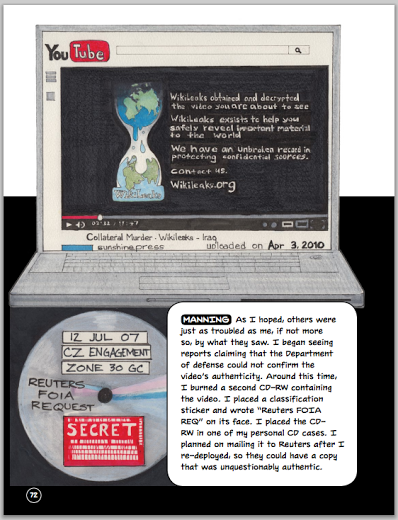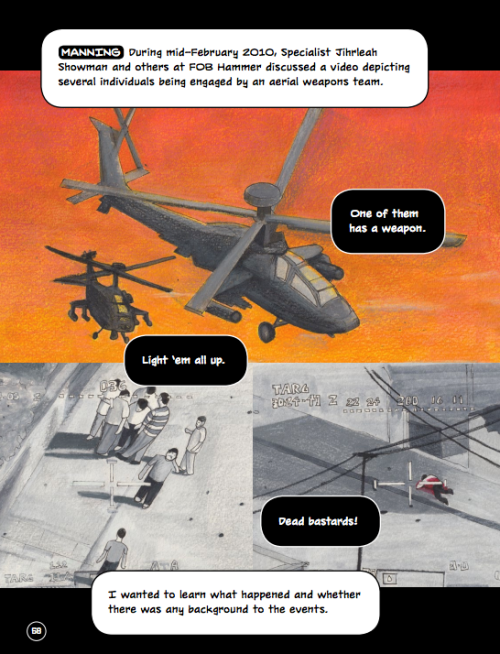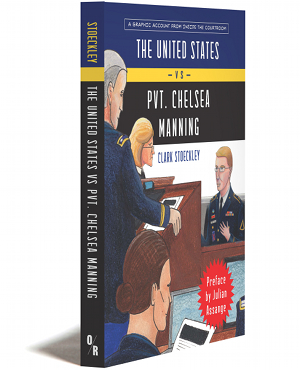Conscience on trial: the United States vs Manning
- May 26, 2014
Authority & Abolition
Clark Stoeckley’s new book sheds a bright light on the case of Private Manning, whose trial the US government has tried so hard to shroud in secrecy.
- Author
August 21, 2013. “The accused and counsel please rise. Bradley E. Manning, this court sentences you to be reduced to the grade of E1, to forfeit all pay and allowances, to be confined for 35 years and to be dishonorably discharged from the service.” Thus spoke Colonel Denise Lind, presiding military judge in the trial of Chelsea Manning.
Reading succinct verbiage from unofficial transcript provided in Clark Stoeckley’s essential work, The United States Vs. Pvt. Chelsea Manning, I was struck by the extraordinary violence encapsulated in this grotesquely disproportional, premeditated sentence uttered in the service of empire. Several months later the very same words, with only some minor adjustments, would be uttered by Loretta A. Preska, Chief Judge in the case of another political prisoner; Jeremy Hammond.
 So enters the other half of this book’s fascinating and essential characteristic — the graphic illustrations by Stoeckley himself that animate the selected testimony on every page. As a credentialed journalist, Stoeckley had “the privilege of sitting on both sides of the gallery, in the jury box, and inside the remote media center where they projected a live feed of the trial onto a large screen.” For an obvious partisan, driving a box truck famously emblazoned with the WikiLeaks logo and a block lettered exhortation to “Release Bradley Manning”, Stoeckley was granted a remarkable degree of access both on base and in the courtroom, “attending thousands of hours of proceedings” and drawing what he witnessed.
So enters the other half of this book’s fascinating and essential characteristic — the graphic illustrations by Stoeckley himself that animate the selected testimony on every page. As a credentialed journalist, Stoeckley had “the privilege of sitting on both sides of the gallery, in the jury box, and inside the remote media center where they projected a live feed of the trial onto a large screen.” For an obvious partisan, driving a box truck famously emblazoned with the WikiLeaks logo and a block lettered exhortation to “Release Bradley Manning”, Stoeckley was granted a remarkable degree of access both on base and in the courtroom, “attending thousands of hours of proceedings” and drawing what he witnessed.
Right up until he was being escorted off base by military police and banned from re-entry for an act of wanton hubris so ill-conceived it would take a team of Jungian mind mappers from Sweden to explain it — he was accused of sending out ‘threatening’ tweets the evening before the sentencing — Stoeckley rendered with haunting perspective in black and white one of the best and only visual records we will ever have of what Julian Assange describes, quite accurately, in the book’s foreword as, “America’s foremost political prisoner”.
The pairing of Stoeckley’s graphic impressions together with testimonies from a period extending from Chelsea Manning’s pre-trial hearings begun on December 16, 2011 through sentencing on August 21, 2013 is a natural choice given the paucity of disclosure forthcoming from our government. They were the only options available — and more than the ruling class ever felt we deserved — to see or know about the methodical smothering of yet another human life who, upon seeing the murderous execution of American hegemony acted from a state of moral revulsion and provided the world with visual and audible evidence of it. Our only evidence of her condemnation in a cramped star chamber at Fort Meade is this book.
 Of Manning’s 258 days of incarceration in a 6′ x 8′ cell — 23 hours of every day — at Quantico, former Brig Commander and now retired Colonel Daniel Choike testified, “There were claims he was in solitary. He was not. Punitive segregation was not utilized. Quantico is not about long term — it’s about individual short term, but not long term confinement.” And yet, far beyond the 90 day maximum recommended for Quantico detainees under conditions President Obama gave his blessings to, Chelsea testified:
Of Manning’s 258 days of incarceration in a 6′ x 8′ cell — 23 hours of every day — at Quantico, former Brig Commander and now retired Colonel Daniel Choike testified, “There were claims he was in solitary. He was not. Punitive segregation was not utilized. Quantico is not about long term — it’s about individual short term, but not long term confinement.” And yet, far beyond the 90 day maximum recommended for Quantico detainees under conditions President Obama gave his blessings to, Chelsea testified:
There was no reasonable way of accessing natural light. I ate every meal inside of the cell. I did not have glasses. I cannot see without my glasses. The entire day I sat upright. I was technically allowed to speak to other detainees, but the cells on either side of me were empty. And talking to someone farther away would have violated the “conversational tone” rules. I never had sheets or blankets. If I needed toilet paper, then I would stand up to the front of the door and announce to the observation room, “request permission to use toilet paper”. Sometimes they say they would get it, and then they didn’t.
In a testimony dated November 28, 2012, Navy psychiatrist Capt. Dr. Kevin Moore “also testifies that Manning’s isolation conditions were more severe than that of death row inmates”. On January 8, 2013, Judge Lind found the conditions of Chelsea Manning’s pre-trial confinement at Quantico to be unlawful, thus allowing the defense one of its few moral victories. However, the granting of 112 days of sentence credit sent a message to no one and served to deter nothing. If anything, it was a judicial green light to the Marine Corps chain of command at Quantico and detention facilities across the vast expanse of America’s public, private and secret gulags that unwarranted punishments of a severity bordering on torture will be met with nothing more than mild censure.
For the majority of those deeply vested in the electronic hallucinations that corporate television provides to maintain the mind-numbing circus of dualistic irrelevance that is the entertaining, narcotic interface above the deeply violent psychosis of capitalism beneath, even a cursory browse through the Gitmo Detainee Briefs, the Afghan War Diaries or Iraq War Logs liberated to WikiLeaks by Manning is perhaps too much to expect. But what was forced upon the conscious psyche of denial in America between episodes of Duck Dynasty and The Bachelor was the streaming footage of unbridled blood lust of an Apache gunship crew murdering a group of Iraqi civilians including two reporters for Reuters that in Chelsea Manning’s own testimony published in Stoeckley’s book was something “I wanted the American public to know that not everyone in Iraq and Afghanistan are targets to neutralize, but rather people struggling to live in the pressure cooker environment of what we call asymmetric warfare”. Nobody not dog painting with George Bush in Texas didn’t see that footage dubbed “war porn” by Julian Assange and connect it to Private Chelsea Manning. Stoeckley’s graphic rendering of screen captures from that video shown repeatedly at trial are among the most disturbing of the many found throughout the book.
 One only begins to appreciate through reading The United States Vs. Pvt. Chelsea Manning just how ably Chelsea was represented by lead counsel retired U.S. Army Lieutenant Colonel David Coombs. A veteran attorney of a hundred or more court-marshal proceedings, he was well familiar with the prosecution’s tactics. But even he was unprepared for the intense zeal of a prosecutorial juggernaut bent on winning at any cost. Motion after motion by the defense was refused from the bench while massive allowances were granted to the prosecution which were routinely denied to Coombs and his defense team. A thorough reading of Stoeckley’s book reveals Coombs to be a highly intelligent and very cool cat who was an unflinching and deeply committed attorney that Chelsea could hardly have hoped to improve upon. Coombs never blinked. Given the forces arrayed against her, it is a testament to the legal craft work and tenacity of Coombs that she received “only” 35 years.
One only begins to appreciate through reading The United States Vs. Pvt. Chelsea Manning just how ably Chelsea was represented by lead counsel retired U.S. Army Lieutenant Colonel David Coombs. A veteran attorney of a hundred or more court-marshal proceedings, he was well familiar with the prosecution’s tactics. But even he was unprepared for the intense zeal of a prosecutorial juggernaut bent on winning at any cost. Motion after motion by the defense was refused from the bench while massive allowances were granted to the prosecution which were routinely denied to Coombs and his defense team. A thorough reading of Stoeckley’s book reveals Coombs to be a highly intelligent and very cool cat who was an unflinching and deeply committed attorney that Chelsea could hardly have hoped to improve upon. Coombs never blinked. Given the forces arrayed against her, it is a testament to the legal craft work and tenacity of Coombs that she received “only” 35 years.
Clark Stoeckley has created a powerful, chronological history of a massive American miscarriage of justice. He deserves tremendous credit, along with a relative handful of others, for showing up with his back straight day after day in the belly of the beast and bringing back a work that should have a place on the bookshelves of truth tellers and truth seekers everywhere. Do support OR Books’ courageous decision to publish this book and purchase it directly from them or from an independent book seller carrying the title.
Courage is contagious. Chelsea Manning inspired Jeremy Hammond. And both of them inspire me. And those that attended Chelsea’s trial faithfully day in and day out, putting their lives and careers at risk to bear witness, were inspired and propelled forward by her example — the example Mario Savio implored us all to take when speaking with such passion on the steps of Sproul Hall, U.C. Berkeley, December 2, 1964:
There is a time when the operation of the machine
becomes so odious,
makes you so sick at heart
that you can’t take part.You can’t even passively take part.
And you’ve got to put your bodies upon the gears
and upon the wheels
upon the levers
upon all the apparatus
and you’ve got to make it stop.And you’ve got to indicate to the people who run it,
to the people who own it
that unless you’re free
the machine will be prevented from working at all.
I include the address of Chelsea Manning here for the many that would send kind words of support, encouragement and thanks for throwing her body into the gears of a machine bent on destroying us all. Mail should be addressed exactly as follows:
Chelsea E. Manning 89289
1300 North Warehouse Road
Fort Leavenworth, Kansas 66027-2304
EDITOR’S NOTE: A previous version of this article incorrectly stated that “there is still no official government transcript [of the trial] to refer to.” This assertion was factually incorrect and the paragraph in question has been removed. Thanks to Alan Kurtz for pointing out the error.
The United States vs. Private Chelsea Manning: A graphic account from inside the courtroom by Clark Stoeckley (with a preface by Julian Assange) is published by OR Books and can be ordered online here.
Source URL — https://roarmag.org/essays/chelsea-bradley-manning-trial/


